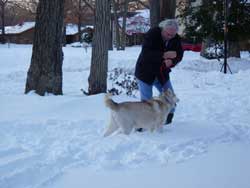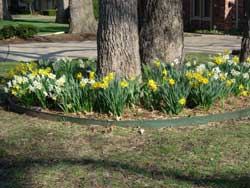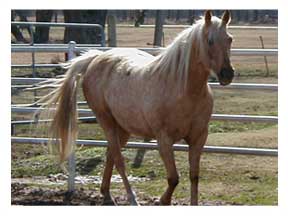Horse Chores For Your Springtime Checklist
 It’s amazing how just a few weeks can impact the weather. At the first of February, northern Oklahoma had it’s second ever blizzard warning. Where I live, there was a record 25″ of snow. Just a few miles north, there was a record setting 50″ and that area also set the record for the coldest temperature of -23°F. There was snow for over 2 weeks, which is also out of the normal for Oklahoma.
It’s amazing how just a few weeks can impact the weather. At the first of February, northern Oklahoma had it’s second ever blizzard warning. Where I live, there was a record 25″ of snow. Just a few miles north, there was a record setting 50″ and that area also set the record for the coldest temperature of -23°F. There was snow for over 2 weeks, which is also out of the normal for Oklahoma.
Now, the temperature was close to 80°F today and the daffodils in my yard have been in bloom for about 2 weeks. We had our first actual thunderstorm just a few days ago. Spring is officially around the corner! So, it may be a good time for some spring chores. Here are some chores that you may want to do.
At the barn:
- Clean and condition your leather tack. Make sure the leather is dry before applying a leather conditioner.
- Inspect the leather for any cracks, cuts or splits. Replace any leather that is damaged.
- Go through your grooming kit. Replace any tools that are broken. This would probably also be a good time to wash your brushes.
- Clean your clippers. You can do this yourself or take them to a professional. You can also have the blades sharpened at the same time.
- Wash your winter blankets, if you are not going to need them anymore. Store them in a dry place. Most blankets come in a zippered plastic bag. I have kept these to store my blankets for the summer. This makes for good dust free storage.
- A warm dry spring day would be perfect to strip your stall completely (if you have one). Let them air out for a few hours before you put bedding back in them. If you have full board, this is probably done periodically through the year.
- Give your trailer a good cleaning. Do a thorough inspection and make note of any damage to floors/walls/ceiling/tackroom, worn tires, damaged lighting/wiring, etc. Make a plan and time frame to get damage fixed.
For the vet:
- Get vaccinations, if you haven’t already done so. Check with your vet as to which basic vaccinations are recommended for your area. Your vet may also have suggestions for additional vaccinations based on the age of your horse and also whether or not you show or trail ride.
- Don’t forget to get the Coggins test. A negative Coggins is required if you plan to show, trail
 ride or take your horse to a riding clinic. Most events want a Coggins that was done within a year, but a few require one that has been done within 6 months of the event.
ride or take your horse to a riding clinic. Most events want a Coggins that was done within a year, but a few require one that has been done within 6 months of the event. - Spring is also when I have my horses’ teeth checked and, if necessary, floated.
- My gelding will have his sheath cleaned, if needed.
There is a multitude of chores that you can do in the spring. This is just a small sample. Plan a work day and make a list of what you want to accomplish that day. If you don’t finish your list, add it to the next planned work day. Don’t try to do everything all in one day . . . . your body won’t like it.

 The floundering economy has touched the horse industry in so many ways. My own personal concession is I had to sell one of my horses. I did this last November (before Iggette passed) to try to cut the rising cost of my board bill as well as the vet bill. I didn’t want to sell Princess (pictured) and it was a hard decsison to make. Actually I was supposed to sell one when I purchased my gelding over 2 years ago. I just didn’t ever get around to it. Quite honestly if we lived on our acreage instead of in town, I wouldn’t have sold her. But she has a very nice owner who decided to stay at the barn where I am, so I get to see her all the time. After Iggette passed away, I was left with 2 horses. Even with my board bill being reduced by 2 horses, the money crunch can still be felt. I have made some small adjustments in my horse keeping to save some money. Here are a few of the ways that I chosen to save money. Please keep in mind that my choices may not work for you. Make your decisions wisely.
The floundering economy has touched the horse industry in so many ways. My own personal concession is I had to sell one of my horses. I did this last November (before Iggette passed) to try to cut the rising cost of my board bill as well as the vet bill. I didn’t want to sell Princess (pictured) and it was a hard decsison to make. Actually I was supposed to sell one when I purchased my gelding over 2 years ago. I just didn’t ever get around to it. Quite honestly if we lived on our acreage instead of in town, I wouldn’t have sold her. But she has a very nice owner who decided to stay at the barn where I am, so I get to see her all the time. After Iggette passed away, I was left with 2 horses. Even with my board bill being reduced by 2 horses, the money crunch can still be felt. I have made some small adjustments in my horse keeping to save some money. Here are a few of the ways that I chosen to save money. Please keep in mind that my choices may not work for you. Make your decisions wisely.
